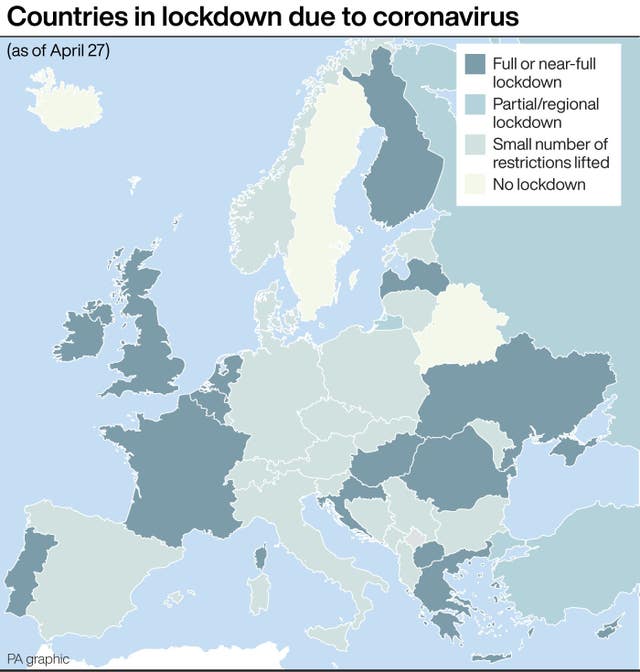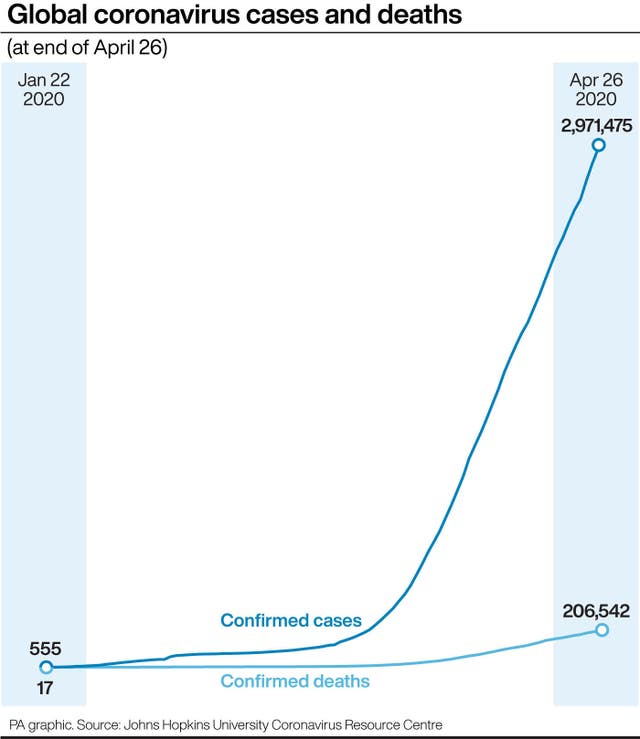
People need to be “mentally prepared” that the Covid-19 pandemic is “nowhere near over”, global health officials have said.
The World Health Organisation (WHO) said there is still “a long road ahead” and countries will be “balancing lives against livelihoods” as they make decisions about lifting lockdowns.
The WHO’s director-general Tedros Adhanom Ghebreyesus told a press briefing in Geneva: “We have a long road ahead of us and a lot of work to do.
“As lockdowns in Europe ease with declining numbers of new cases, we continue to urge countries to find, isolate, test and treat all cases and trace every contact, to ensure these declining trends continue.
READ MORE: Coronavirus in Scotland: Son says father's fatal lung cancer symptoms 'fobbed off' by NHS
“The pandemic is far from over.”
Mike Ryan, executive director of the WHO health emergencies programme, said: “Each country has to balance lives against livelihoods, but at the same time while doing that be assured that if the calculation is made, and restrictions are lifted too early, you may be back in the situation where lockdowns need to be reimposed and that then has a potentially greater impact on livelihoods.”
Maria Van Kerkhove, WHO technical lead for Covid-19, said multiple factors will contribute to decisions on lifting restrictions, adding: “It cannot only be based in the numbers of cases and deaths reported.
“It requires having the entire population engaged and informed to understand that this needs to happen in a slow, measured and controlled way.
“This will take some time. And this is nowhere near over, and we need everyone to be mentally prepared, that we have some more to go.
“And that may require being more patient and having to deal with some of these measures that are difficult to deal with.”
 (PA Graphics)
(PA Graphics)
Governments should not only be looking at capabilities of health facilities – from contact tracing to caring for those who have mild or severe illness – but they should also consider whether social distancing can be in place when schools and workplaces reopen, she added.
Dr Ryan added: “These measures had to be put in place in order to suppress what was a very, very rapidly developing and deteriorating situation in many countries.
READ MORE: Coronavirus: Hugh Pennington: Environmental health officers should train contact tracers
“And it’s to the credit of governments and their people that they’ve managed to successfully suppress the worst parts of the pandemic in their countries.
“The challenge now is how to unlock, how to have an exit strategy that doesn’t result in the disease bouncing back.
 (PA Graphics)
(PA Graphics)
“In a sense, the public health and social measures, the lockdowns have created huge pressure on the virus – they’re preventing them virus finding new victims. And in doing that, you’re putting that pressure on the virus’s capacity to survive.
“And I think it’s really logical that if you lift that pressure too quickly, the virus can jump back.”
Meanwhile the global health body warned that children will die if people do not continue with routine vaccination schedules during the pandemic.
Concerns have been raised that people are avoiding health facilities amid fears over the virus.
"Even when services are operating, some parents & caregivers are avoiding taking their children to be vaccinated because of concerns about #COVID19.
Myths & misinformation about vaccines are adding fuel to the fire, putting vulnerable people at risk"-@DrTedros #VaccinesWork
— World Health Organization (WHO) (@WHO) April 27, 2020
Dr Tedros said: “Children may be at relatively low risk from severe disease and death from Covid-19, but can be at high risk from other diseases that can be prevented with vaccines.
“There are still more than 13 million children around the world who miss out on vaccination. We know that that number will increase because of Covid-19.”


Why are you making commenting on The Herald only available to subscribers?
It should have been a safe space for informed debate, somewhere for readers to discuss issues around the biggest stories of the day, but all too often the below the line comments on most websites have become bogged down by off-topic discussions and abuse.
heraldscotland.com is tackling this problem by allowing only subscribers to comment.
We are doing this to improve the experience for our loyal readers and we believe it will reduce the ability of trolls and troublemakers, who occasionally find their way onto our site, to abuse our journalists and readers. We also hope it will help the comments section fulfil its promise as a part of Scotland's conversation with itself.
We are lucky at The Herald. We are read by an informed, educated readership who can add their knowledge and insights to our stories.
That is invaluable.
We are making the subscriber-only change to support our valued readers, who tell us they don't want the site cluttered up with irrelevant comments, untruths and abuse.
In the past, the journalist’s job was to collect and distribute information to the audience. Technology means that readers can shape a discussion. We look forward to hearing from you on heraldscotland.com
Comments & Moderation
Readers’ comments: You are personally liable for the content of any comments you upload to this website, so please act responsibly. We do not pre-moderate or monitor readers’ comments appearing on our websites, but we do post-moderate in response to complaints we receive or otherwise when a potential problem comes to our attention. You can make a complaint by using the ‘report this post’ link . We may then apply our discretion under the user terms to amend or delete comments.
Post moderation is undertaken full-time 9am-6pm on weekdays, and on a part-time basis outwith those hours.
Read the rules hereLast Updated:
Report this comment Cancel